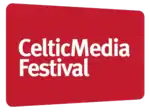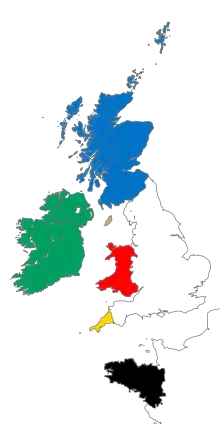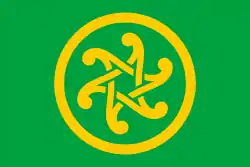Celtic Media Festival
The Celtic Media Festival, formerly known as the Celtic Film and Television Festival, aims to promote the languages and cultures of the Celtic nations in film, on television, radio and new media. The festival is an annual three-day celebration of broadcasting and film from Scotland, Ireland, Wales, Isle of Man, Cornwall and Brittany. The festival was founded in 1980.
 | |
| Location | Celtic nations |
|---|---|
| Founded | 1980 |
| Awards | Torc Awards |
| Directed by | Pádhraic Ó Ciardha |
| Produced by | Catriona Logan |
| Language | Scottish Gaelic, Irish, Welsh, Manx, Cornish and Breton |
| Website | www |
History
The festival was first held in 1980, on the Scottish islands of South Uist and Benbecula. The 30th festival was held in March 2009 in Caernarfon, Wales. The festival presents the Torc Awards to the winners of 22 different categories.
The festival also presents a Gold Torc to the winner of Spirit of the Festival Award - a film or television programme wholly or substantially in a Celtic language that encapsulates the spirit of the Celtic Media Festival.
Chairs
The Celtic Media Festival has been chaired by representatives from the broadcasting industry:[1]
Irish Chairs:
- Pádhraic Ó Ciardha, TG4
- Neasa Ní Chinnéide, RTÉ
- Bob Collins, RTÉ
- Con Bushe, RTÉ
- Muiris MacConghail, RTÉ
- Cathal Goan, RTÉ
Scottish Chairs:
- Donald Waters, Grampian Television
- Neil Fraser, BBC Scotland
- Maggie Cunningham, BBC Scotland
- Domhnall Caimbeul, MG ALBA
Welsh Chairs:
- Huw Jones, S4C
- John Hefin, Wales Film Council
- Owen Edwards, S4C
Festival Locations
- 2019 - Aviemore, Scotland
- 2018 - Llanelli, Wales
- 2017 - Douglas, Isle of Man
- 2016 - Dungarvan, Ireland[2]
- 2015 - Inverness, Scotland[3]
- 2014 - St Ives, Cornwall
- 2013 - Swansea, Wales
- 2012 - Derry, Northern Ireland
- 2011 - Stornoway, Scotland
- 2010 - Newry, Northern Ireland
- 2009 - Caernarfon, Wales
- 2008 - Galway, Ireland
- 2007 - Skye, Scotland
- 2006 - Falmouth, Cornwall
- 2005 - Cardiff, Wales
- 2004 - Dundee, Scotland
- 2003 - Belfast, Northern Ireland
- 2002 - Quimper, Brittany
- 2001 - Truro, Cornwall[4][5]
- 2000 - Aberystwyth, Wales
- 1999 - Skye, Scotland
- 1998 - Tralee, Ireland
- 1997 - St Ives, Cornwall
- 1996 - Bangor, Wales
- 1995 - Fort William, Scotland
- 1994 - Derry, Northern Ireland
- 1993 - Lorient, Brittany
- 1992 - Carmarthen, Wales
- 1991 - Inverness, Scotland
- 1990 - Gweedore, Ireland
- 1989 - Roscoff, Brittany
- 1988 - Caernarfon, Gwynedd, Wales
- 1987 - Inverness, Scotland
- 1986 - Newcastle, Northern Ireland
- 1985 - Douarnenez and Rennes, Brittany
- 1984 - Cardiff, Wales
- 1983 - Glasgow, Scotland
- 1982 - Wexford, Ireland
- 1981 - Harlech, Wales
- 1980 - Benbecula, Scotland
Categories
- Documentary / Factual : Factual Series - Factual Entertainment - Single Documentary - History - Sport - Arts - Current Affairs
- Drama : Short Drama - Single Drama - Drama Series
- Further Screen Categories : Comedy - Animation - Children - Entertainment - Short Form
- Radio : Radio Station of the Year - Radio Documentary - Radio Music Programme - Radio Sports - Radio Presenter/Personality - Radio Comedy - Radio Magazine Show
References
- "Past Festivals". celticmediafestival.co.uk. Celtic Media Festival. Retrieved 22 January 2021.
- Slattery, Laura (22 April 2016). "Ten TV trends at the Celtic Media Festival". The Irish Times. Retrieved 27 November 2016.
- Spowart, Nan (16 April 2015). "Referendum coverage under spotlight at Celtic Media Festival". The National. Retrieved 27 November 2016.
- "Winners - Truro 2001". celticmediafestival.co.uk. Celtic Media Festival. Retrieved 21 January 2021.
- "Celtic Film and Television Festival, Truro". iftn.ie. Irish Film & Television Network. 6 April 2001. Retrieved 21 January 2021.

